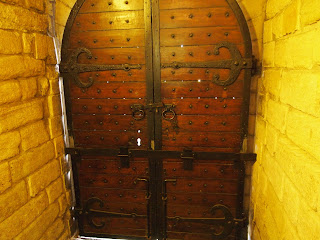"Do you think things always have an explanation?"
"Yes. I believe that they do. But I think that with our human limitations we're not always able to understand the explanations. But you see, Meg, just because we don't understand doesn't mean that the explanation doesn't exist." (pg.53)
The children's book, A Wrinkle in Time, (click for a review at B&N) turns 50 this year, and it's out in a new hardback edition. Madeleine L'Engle is one of my favourite authors from my middle school and high school days. I still pull her books off my shelves every now and then to revisit her beautiful writing, both fiction and non-fiction. Her books become even more enjoyable with a second (or third) reading. I think this 50th anniversary of Wrinkle was temptation enough to pull it off my shelf and read it again. So this weekend, I re-read Wrinkle. It is hard to believe that a wonderful story like this was rejected by publishers over and over before it was finally published in 1962.
For those people who aren't big sci-fi fans, this wouldn't initially attract you, however, I implore you to give it a chance. Like C.S. Lewis' Narnia series, you as the reader have to let go of your adulthood and think openly like a child. That is why children are such a big part of the Narnia books and the Wrinkle series. Both of these series are written for the younger reader, elementary and middle schoolers, but the morals and Christian themes instilled in these adventure stories are written in indelible ink on the reader's mind. Evidence of the Cold War era is particularly clear in the depiction of the dark world that holds a family member captive. Themes of family, love, and using your talents for good shine throughout the story.
What I love most about these books, is how as an adult I appreciate the story and the deeper meanings more than I ever could when I was a young reader. That, to me, is the mark of truly timeless books. Books that should be read as children and as adults. Sometimes we adults need to be reminded of truths through the eyes (actions, thoughts, and stuggles) of these young characters. Who could not relate to Meg's awkwardness and struggles in school or her taking for granted her wonderful (yet quirky) family? Who wouldn't travel through the universe to save a family member from evil? Who hasn't felt the power of love conquer the darkness? Let this book tesser you (fifth-dimensional travel by taking the short cut through space) to adventures and reminders of God's love through creative storytelling.
"You mean you're comparing our lives to a sonnet? A strict form, but freedom within it?"
"Yes." Mrs. Whatsit said. "You're given the form, but you have to write the sonnet yourself. What you say is completely up to you." (pg.219)

















































